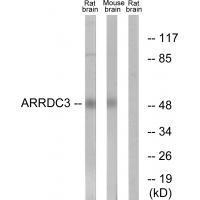
| WB | 咨询技术 | Human,Mouse,Rat |
| IF | 咨询技术 | Human,Mouse,Rat |
| IHC | 咨询技术 | Human,Mouse,Rat |
| ICC | 技术咨询 | Human,Mouse,Rat |
| FCM | 咨询技术 | Human,Mouse,Rat |
| Elisa | 咨询技术 | Human,Mouse,Rat |
| Aliases | Arrestin domain-containing protein 3; ARRDC3; KIAA1376; |
| Entrez GeneID | 57561; |
| WB Predicted band size | 46kDa |
| Host/Isotype | Rabbit IgG |
| Antibody Type | Primary antibody |
| Storage | Store at 4°C short term. Aliquot and store at -20°C long term. Avoid freeze/thaw cycles. |
| Species Reactivity | Human,Mouse,Rat |
| Immunogen | Synthesized peptide derived from C-terminal of human ARRDC3. |
| Formulation | Purified antibody in PBS with 0.05% sodium azide. |
+ +
以下是关于ARRDC3抗体的参考文献示例(注:内容基于模型知识库总结,建议核实原文准确性):
---
1. **文献名称**: *ARRDC3 suppresses breast cancer progression through negatively regulating integrin β4*
**作者**: Li, S. et al.
**摘要**: 该研究利用ARRDC3抗体进行免疫印迹和免疫荧光实验,证明ARRDC3通过抑制整合素β4信号通路抑制乳腺癌转移,揭示了其作为肿瘤抑制因子的机制。
---
2. **文献名称**: *The arrestin domain-containing 3 protein regulates body mass and energy expenditure*
**作者**: Patwari, P. et al.
**摘要**: 通过ARRDC3抗体进行小鼠脂肪组织免疫组化分析,发现ARRDC3调控脂肪分解及能量代谢,敲除小鼠表现出肥胖表型,提示其在代谢疾病中的潜在作用。
---
3. **文献名称**: *ARMMs: TRIM23-dependent vehicles for intracellular transport of ARRDC3*
**作者**: Nabhan, J.F. et al.
**摘要**: 使用ARRDC3抗体进行免疫共沉淀和蛋白质定位研究,揭示ARRDC3通过TRIM23依赖的膜相关颗粒(ARMMs)介导跨膜蛋白运输,如Notch受体的降解。
---
4. **文献名称**: *ARRDC3-mediated extracellular vesicle biogenesis in cancer progression*
**作者**: Sterzenbach, U. et al.
**摘要**: 研究通过抗体验证ARRDC3在外泌体中的表达,证明其通过WW结构域招募TSG101.促进致癌蛋白通过细胞外囊泡分泌,影响肿瘤微环境。
---
以上文献均涉及ARRDC3抗体的实验应用(如Western blot、免疫组化等),具体细节建议参考原文方法部分。
ARRDC3 (Arrestin Domain-Containing Protein 3) is a member of the α-arrestin protein family, which plays roles in membrane protein trafficking, ubiquitination, and lysosomal degradation. It functions as an adaptor protein, mediating interactions between E3 ubiquitin ligases (e.g., NEDD4) and target substrates, thereby regulating processes like receptor endocytosis, signal transduction, and extracellular vesicle biogenesis. ARRDC3 has been implicated in metabolic regulation, cancer progression, and immune responses, with studies linking it to adipogenesis, glucose metabolism, and tumor suppression or promotion depending on cellular context.
ARRDC3 antibodies are essential tools for detecting and characterizing the protein’s expression, localization, and interactions in research. These antibodies are commonly used in techniques such as Western blotting (WB), immunofluorescence (IF), and immunoprecipitation (IP). Polyclonal and monoclonal variants target specific epitopes, often within the C-terminal or N-terminal regions. Validation data, including knockout cell line testing, are critical to confirm specificity due to potential cross-reactivity with other arrestin family members. ARRDC3 antibodies have facilitated discoveries in cancer biology (e.g., breast and prostate cancer), metabolic disorders, and exosome research, highlighting their versatility in studying cellular pathways and disease mechanisms.
×